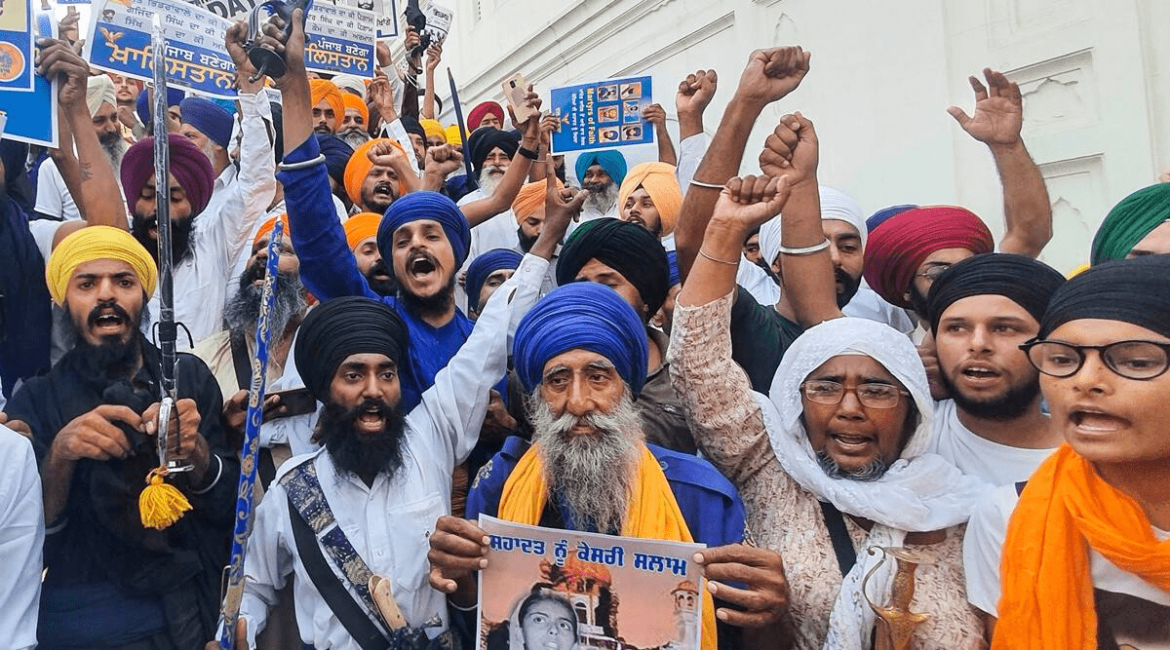AI Generated Summary
- The seemingly higher pro-Khalistan sentiment among Sikhs living abroad can be attributed to a combination of factors, including distance from the direct impact of violence, perceived lack of justice, identity preservation, political lobbying, and the influence of social media.
- Social media amplifies the voices of pro-Khalistan activists and provides a means for the diaspora to engage with the issue, which may not be as readily available to Sikhs in India.
- This perceived lack of justice drives the pro-Khalistan sentiment in the diaspora, which may not be as pronounced in India, where many have moved on from the trauma of the past.
As the political landscape of India continues to evolve, the issue of Khalistan remains a topic of heated debate. Khalistan, a proposed sovereign Sikh state in the Punjab region, has been the focal point of separatist movements since the 1970s. However, an intriguing question arises when we examine the sentiment towards Khalistan among Sikhs living in India versus those residing abroad: why does it seem that Sikhs living abroad tend to be more pro-Khalistan than their counterparts in India?
To understand this phenomenon, we must first delve into the historical context of the Khalistan movement. The peak of the movement occurred in the 1980s and early 1990s, marked by a surge in violence and loss of lives on both sides. The brutal crackdown by the Indian government, coupled with a lack of political representation for Sikhs, fueled the separatist sentiment. However, over time, the movement lost momentum in India due to a combination of factors, including improved political representation and socioeconomic conditions for Sikhs.
Despite this apparent decline in the Khalistan movement within India, it remains a potent force among the Sikh diaspora. There are several reasons for this discrepancy, which we shall explore below.
Distance from the direct impact of violence: Sikhs living abroad have not experienced the violence and unrest that accompanied the Khalistan movement in India. They may romanticize the idea of Khalistan without fully comprehending the potential consequences of its pursuit. For some, it may represent an idealized homeland that can address the challenges and discrimination faced by Sikhs in India, even though the reality may be far more complex.
Perceived lack of justice: Many Sikhs living abroad feel that the atrocities committed during the height of the Khalistan movement have not been adequately addressed by the Indian government. They argue that victims and their families have not received justice, fueling a sense of disillusionment with the Indian political system. This perceived lack of justice drives the pro-Khalistan sentiment in the diaspora, which may not be as pronounced in India, where many have moved on from the trauma of the past.
Identity preservation: Sikhs living abroad often grapple with maintaining their cultural and religious identity in a foreign land. Supporting the idea of Khalistan can serve as a means of reinforcing their Sikh identity and asserting their distinctiveness from the broader Indian community. In contrast, Sikhs in India are more likely to find their identity within the diverse cultural fabric of the nation.
Political lobbying and funding: The pro-Khalistan sentiment among the Sikh diaspora has been amplified through well-funded lobbying efforts and organizations based in countries like the United States, Canada, and the United Kingdom. These groups provide a platform for the expression of pro-Khalistan views, which may not receive the same level of support in India.
Influence of social media: The proliferation of social media has provided a global platform for the exchange of ideas and information. It has allowed the Sikh diaspora to remain connected to the issues faced by their community in India, even from thousands of miles away. Social media amplifies the voices of pro-Khalistan activists and provides a means for the diaspora to engage with the issue, which may not be as readily available to Sikhs in India.
Foreign Interference: Another vital aspect to consider in understanding the pro-Khalistan sentiment among Sikhs living abroad is the interference and influence of Pakistan and its intelligence agency, the Inter-Services Intelligence (ISI). Several reports have suggested that the ISI has been actively supporting and promoting the Khalistan movement to destabilize India and create discord within the Sikh community. By providing financial and logistical support to pro-Khalistan organizations, the ISI seeks to exploit the existing grievances and sentiments among Sikhs abroad.
The seemingly higher pro-Khalistan sentiment among Sikhs living abroad can be attributed to a combination of factors, including distance from the direct impact of violence, perceived lack of justice, identity preservation, political lobbying, and the influence of social media. It is essential to understand and address these factors to foster a constructive dialogue between Sikhs living in India and abroad. Building bridges and promoting mutual understanding is crucial for the future of the Sikh community as a whole. By acknowledging and addressing the differing perspectives and experiences of Sikhs around the world, we can work towards fostering unity and promoting a shared vision of progress and harmony. Emphasizing the importance of dialogue and collaboration, both within the Sikh community and with the broader Indian society, will help to bridge the gaps in understanding and pave the way for a more inclusive and cohesive future for all.




